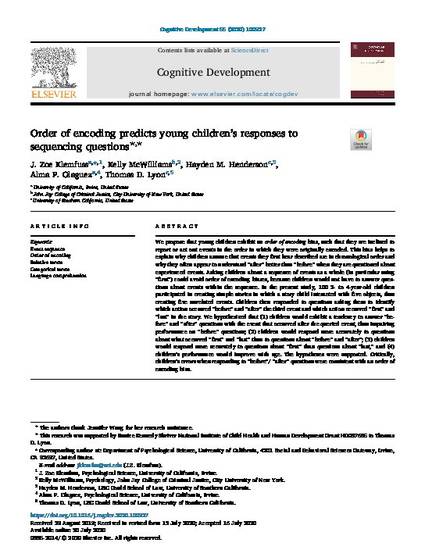
Article
77. Order of Encoding Predicts Young Children’s Responses to Sequencing Questions.
Cognitive Development
(2020)
Abstract
We propose that young children exhibit an order of encoding bias, such that they are inclined to report or act out events in the order in which they were originally encoded. This bias helps to explain why children assume that events they first hear described are in chronological order and why they often appear to understand “after” better than “before” when they are questioned about experienced events. Asking children about a sequence of events as a whole (in particular using “first”) could avoid order of encoding biases, because children would not have to answer questions about events within the sequence. In the present study, 100 2- to 4-year-old children participated in creating simple stories in which a story child interacted with five objects, thus creating five unrelated events. Children then responded to questions asking them to identify which action occurred “before” and “after” the third event and which action occurred “first” and “last” in the story. We hypothesized that (1) children would exhibit a tendency to answer “before” and “after” questions with the event that occurred after the queried event, thus impairing performance on “before” questions; (2) children would respond more accurately to questions about what occurred “first” and “last” than to questions about “before” and “after”; (3) children would respond more accurately to questions about “first” than questions about “last,” and (4) children’s performance would improve with age. The hypotheses were supported. Critically, children’s errors when responding to “before”/ “after” questions were consistent with an order of encoding bias.
Keywords
- child abuse,
- child sexual abuse,
- child neglect,
- child testimony,
- children's responses,
- sequences questions,
- order of encoding
Disciplines
Publication Date
Summer July 17, 2020
DOI
10.1016/j.cogdev.2020.100927
Citation Information
Klemfuss, J.Z., McWilliams, K., Henderson, H.M., Olaguez, A.P., & Lyon, T.D. (2020). Order of Encoding Predicts Young Children’s Responses to Sequencing Questions. Cognitive Development, 55, 100927.
